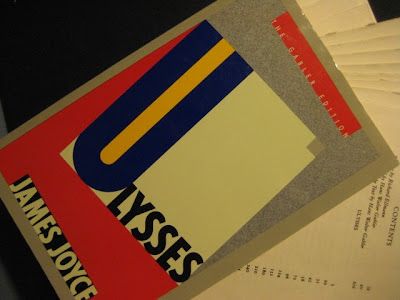
Ulysses in its paperback glory
I wish my parents had read more. Actually, that’s a pretty heartless thing to say given that my father came to this country as a Vietnam war refugee. With barely a word of English and with barely a cent in their pockets, my parents had larger problems on their minds than literature. But when you are the first generation son, who has discovered for himself that his future is in tracing books to their textual and cultural sources, how can you wish any differently?
Today, the classics—the classics of all things—are made so cheaply, that they yellow or fall apart within a year. The most egregious case I’ve come across has to be the Gabler edition of Ulysses, an edition which purports to be authoritative, but whose integrity is undermined by its ramshackle construction. Ulysses is a literary liner that should have never ventured into the perilous waters of paperback fiction, but because it did, I have a poorly glued edition that sheds pages like a cat sheds hair. Fortunately, I found some time ago a 1960 edition by Modern Library. I want to say it was dedicated to a girl named Molly, but that would be stretching the truth. Wherever you are Mel, I have your book.
The story of this grad student is that of the kid who goes to a candy store, only to discover that the lollipops have already been licked and the chocolate bars gnawed. Doesn’t mean, however, that the candy is bad. I’ve rummaged through enough used-book stores to know now that you will never find that perfect artifact. There’s always going to be some flaw, or rather, mark of character: clipped dust jackets, dented boards, imperfectly aligned book plates, shelf wear, remainder marks, and yes, dedications you wished you had never read. To be continued…
February 15th, 2009

Big Table 4, the Chicago based little magazine, featured the work of America’s avant-garde poets in the sixties: the Beats, the San Francisco Renaissance, the New York School, and the Black Mountain School.
For every mark of ownership is depressing. I imagine something awful must have occurred for someone to sell their books, books that were expressly dedicated to them. What if I’m holding in my hands the article of a person who just died last week? Or what if that person, or perhaps their children, sold that book, with its loving dedication, to pay the rent? And then I get home and realize that that this book is something that will never belong to me, because I was not born into this culture of preserving and collecting and handing down books. This is how V.S. Naipaul must have felt before writing “A House for Mr. Biswas.” After living all his life in the homes of relatives and reading so many used books about this wonderful place called London, Mr. Biswas, who will never have the chance to see London, is so desperate to own his own home that he uses his life savings to build a home he doesn’t have enough money finish. The irony of the novel is that a tar paper home that you can call your own is a small victory nonetheless, though it be in poorer shape than his books.
My online search for older editions of the classics, has produced mixed results.
You never know what your getting when you order something without seeing it first. No matter how promising the description sounds, very good means “average” and “good” means as clean as the walls of a toilet stall and as usable as the paper in it. The longer and more detailed the quality assurance, the better your chances of success, but you really need to read carefully. Library copies are okay, but not desirable. In any case, the excitement of ripping open a book package is untainted by the uncertainty that the book you just bought is a dud. To be continued…
February 15th, 2009